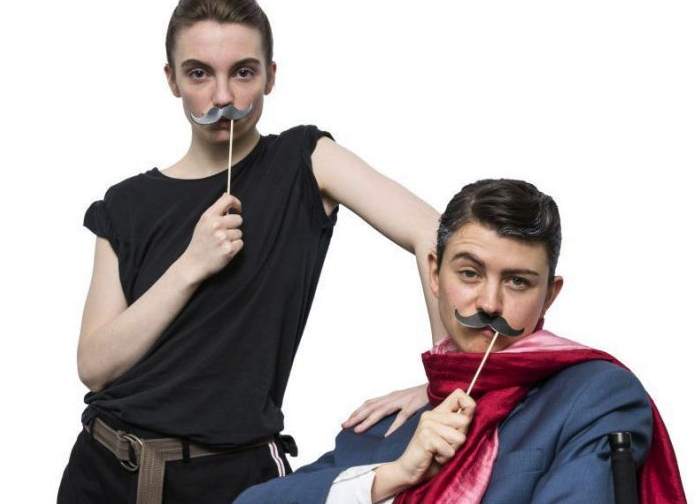
A well-known actor, Thommy, is in a rehearsal room. He is directing a one-man show that he has devised together with a younger and equally famous actor called Micke. There is considerable tension in the air because time is running out, the script is unfinished and Micke is late. Eventually he turns up, and they ostensibly work together to create this new masterpiece. They greet each other in a matey, back-slapping fashion, but competition, not cooperation, is the order of the day. There is much posturing and point-scoring. Thommy is scornful of Micke’s success in Hollywood – it’s just ‘running around with a gun’. Micke, in turn, points out that Thommy’s earlier foray into Hollywood came to nothing. There’s even an episode of power-play involving sugar cubes. It’s a clash of two alpha males, full of sound and fury, but achieving nothing. They are going to fail.
All that macho strutting is futile, and its ridiculousness is highlighted by the fact that Thommy and Micke are played by women. Written by Swedish performance artists Eva Johansson and Louise Löwenberg, The Greatest Of The Greatest mocks male behaviour, particularly of the white, middle-class kind. Sophie Walter brilliantly conveys Thommy’s self-importance, his utter inability to give ground. As Micke, Rosie Taylor-Ritson is the challenging young buck, very quick to remind Thommy that it is his life story that they are dramatising, not Thommy’s. Both actors display comically heightened versions of masculine non-verbal communication with great skill; there is much striding, chest-beating and man-spreading. They’ve mastered all the appropriate vocal mannerisms too, right down to the last grunt. In a world of male power and authority this kind of behaviour can seem ‘normal’, but having it portrayed by women is a welcome corrective, for we see it for the destructive nonsense that it is.
The Greatest Of The Greatest is very loosely based on a real-life event. Thommy Berggren is a veteran actor and director who has been showered with awards, and Mikael ‘Micke’ Persbrandt is a hugely popular actor in Sweden who British audiences will have seen in The Hobbit and the Netflix hit Sex Education. In 2010 they announced that they were working on a masterpiece based on Persbrandt’s life, but after a series of postponements the show was suddenly cancelled, without explanation. Johansson and Löwenberg have seized upon this failure as their starting point. Swedish audiences would surely find that much of the humour in The Greatest Of The Greatest would arise from seeing two famous theatrical icons being outrageously lampooned. But Berggren and Persbrandt are not anything like so well-known in the UK, so for us the characters Thommy and Micke lack that specificity. However, as an absurdist, radical feminist critique of a certain kind of masculinity, The Greatest Of The Greatest certainly packs a punch. There’s a great deal of entertaining silliness, too. I particularly liked the idea that with just one week to go before the opening night Thommy and Micke are arguing about the basic format of the show. Should it be stand-up comedy or ballet?
Director and translator Charissa Martinkauppi has created a production that very successfully highlights the risibility of certain male behaviours. There are also some sideswipes at actorly pretensions, too. Some of the laughter from fellow drama students in last night’s audience made me suspect that there might have been one or two in-jokes involved. Martinkauppi has been served outstandingly well by two actors who have gleefully grasped the opportunity to be swaggeringly macho. The Greatest Of The Greatest is rather a blunt instrument, somewhat lacking in nuance or analysis, but it is great fun. ★★★☆☆ Mike Whitton 8th May 2019

